
Journal of Fish and Wildlife Management
metrics 2024
Advancing conservation through innovative research.
Introduction
The Journal of Fish and Wildlife Management, published by the U.S. Fish & Wildlife Service, serves as a vital resource for scholars, researchers, and professionals in the fields of Animal Science, Ecology, and Conservation Biology. With its ISSN 1944-687X, this esteemed journal has been disseminating critical research findings since 2010, contributing significantly to the understanding of fish and wildlife conservation practices and their ecological impacts. Despite its Q3 category rankings in various disciplines as of 2023, it provides a platform for innovative research that influences policy and management strategies for biodiversity conservation. The journal, although not open access, remains committed to advancing the scientific discourse surrounding wildlife management with articles that emphasize practical conservation efforts and ecological sustainability. Readers can expect a diverse range of articles that promote best practices in the management and conservation of fish and wildlife resources, furthering our collective mission of preserving ecological health and biodiversity for future generations.
Metrics 2024
 0.31
0.31 0.90
0.90 0.90
0.90 26
26Metrics History
Rank 2024
Scopus
IF (Web Of Science)
JCI (Web Of Science)
Quartile History
Similar Journals
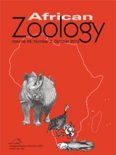
AFRICAN ZOOLOGY
Advancing Knowledge in Animal ScienceAFRICAN ZOOLOGY, published by Taylor & Francis Ltd, stands as a significant journal in the realm of Animal Science and Zoology, with a proud history dating back to 1996 and slated to continue until 2024. With an ISSN of 1562-7020 and E-ISSN 2224-073X, this journal provides a reputable platform for researchers and practitioners dedicated to the study of animal biology across the African continent. It has been recognized for its quality scholarship, evidenced by its Q3 categorization in the 2023 Scopus quartile rankings and an impressive rank of #182 out of 490 within its field. As an open-access journal, it facilitates the dissemination of vital research findings and promotes broader accessibility, catering to a diverse audience of professionals, scholars, and students alike. The journal aims to enhance our understanding of wildlife, conservation, and ecosystem dynamics in Africa, fostering collaborations that address critical ecological challenges. For researchers and enthusiasts keen on contributing to and staying informed about advancements in zoological science, AFRICAN ZOOLOGY is an essential resource that enriches the global discourse on biodiversity and conservation efforts.

CALIFORNIA FISH AND GAME
Championing Biodiversity and Ecological InsightCalifornia Fish and Game is a prominent journal dedicated to the fields of Animal Science and Aquatic Science, published by the California Fish and Game Editor. With its roots extending back to 1979, the journal has served as a vital platform for disseminating research focused on the wildlife and aquatic ecosystems of California and beyond. Recognized within the Q4 quartile for both Animal Science and Zoology and Aquatic Science, it provides critical insights and scholarly contributions, despite its comparative rankings within the respective categories. The journal, with an ISSN of 0008-1078 and an E-ISSN of 2331-0405, offers an invaluable resource for researchers, professionals, and students alike, looking to deepen their understanding of California's rich biodiversity and ecological challenges. For those interested in open access options, further details can be reviewed through the journal's platform. By fostering a community of inquiry, California Fish and Game plays an essential role in advancing knowledge and conservation efforts in the fields of interest.
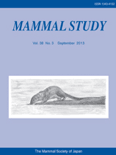
MAMMAL STUDY
Illuminating the path to understanding mammalian diversity.Mammal Study, published by the Mammalogical Society of Japan, is a leading academic journal dedicated to the field of mammalogy and related biological sciences. Since its inception, it has provided a critical platform for researchers, professionals, and students to share their findings and insights into the diverse facets of mammalian biology, ecology, and conservation. The journal, with ISSN 1343-4152 and E-ISSN 1348-6160, is recognized for its rigorous peer-review process and has attained a commendable Q3 ranking in the 2023 category of Animal Science and Zoology. With an impact factor reflecting its growing influence—ranking 283 out of 490 in Scopus—we welcome contributions that advance the understanding of mammalian species and their habitats. While access to published articles is through traditional channels, the journal aims to reach an even wider audience by fostering greater awareness and appreciation for mammalian research and conservation efforts. The Mammal Study has converged years of insightful publications from 2008 to 2024, solidifying its position as a vital resource in the biological sciences.
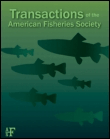
TRANSACTIONS OF THE AMERICAN FISHERIES SOCIETY
Connecting researchers with the essence of aquatic life.TRANSACTIONS OF THE AMERICAN FISHERIES SOCIETY, published by Wiley, is a leading journal dedicated to the field of fisheries science and aquatic ecology, with a rich history dating back to its inception in 1872. As an esteemed publication within the realms of Aquatic Science and Ecology, Evolution, Behavior, and Systematics, it currently holds a Q2 quartile ranking, demonstrating its significance and influence in these disciplines. The journal is not open access, which enables a curated peer-review process while ensuring high-quality research dissemination. The journal serves as a vital platform for scholars and practitioners alike, providing essential insights into the management and conservation of aquatic resources. Its commitment to addressing contemporary challenges faced in fisheries and aquatic environments makes it indispensable for researchers, professionals, and students seeking to contribute to this dynamic field.

EUROPEAN JOURNAL OF WILDLIFE RESEARCH
Connecting researchers and policymakers for a thriving ecosystem.European Journal of Wildlife Research, published by SPRINGER, is a key academic resource in the fields of ecology, evolution, behavior, and systematics, as well as management, monitoring, policy, and law related to wildlife conservation. With an impressive Q2 categorization among its peers, this journal serves as a vital platform for interdisciplinary research, fostering dialogue among researchers, conservationists, and policymakers. The journal focuses on innovative studies that delve into wildlife ecology, population dynamics, and species management, contributing significantly to our understanding and preservation of biodiversity in various landscapes. Although its coverage in Scopus ended in 2003, the journal's heritage is deeply rooted in the field, dating back to its inception in 1955, and continues to influence contemporary research practices. As an open-access journal, it allows for broad dissemination of knowledge, ensuring that vital findings reach a global audience, making it a valuable reference for students, professionals, and academics committed to wildlife research.

CONSERVATION GENETICS
Championing Genetic Diversity in Conservation EffortsCONSERVATION GENETICS is a leading journal dedicated to the study of genetic diversity and its implications for conservation biology. Published by SPRINGER in the Netherlands, it serves as a vital resource for researchers, professionals, and students interested in the intersection of genetics and environmental stewardship. With an ISSN of 1566-0621 and a focus on articles published since 1994, this journal currently holds impressive rankings, including Q2 in Ecology, Evolution, Behavior, and Systematics and Q3 in Genetics as of 2023, making it a pivotal platform in these fields. Although not an Open Access journal, it provides substantial insights into conservation strategies and genetic research, facilitating the understanding of species preservation and biodiversity. By contributing to the discourse surrounding genetic factors in conservation, CONSERVATION GENETICS underscores the importance of integrating genetic knowledge for effective management of natural resources and ecosystem sustainability. Join a community of scholars committed to advancing the science of conservation genetics through innovative research and collaborative inquiry.
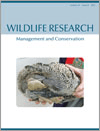
WILDLIFE RESEARCH
Exploring the Dynamics of Wildlife and EcosystemsWILDLIFE RESEARCH is a leading journal dedicated to the rigorous study of wildlife ecology and management, published by CSIRO PUBLISHING in Australia. With a notable ISSN of 1035-3712 and an E-ISSN of 1448-5494, this prestigious journal has been at the forefront of advancing knowledge in the fields of ecology, evolution, behavior, and systems since its inception in 1974. Spanning over four decades, WILDLIFE RESEARCH has established itself as a Q1 journal in Ecology, Evolution, Behavior and Systematics and Q2 in Management, Monitoring, Policy and Law as of 2023, indicating its substantial impact and relevance in these critical areas. It ranks impressively in Scopus, with scores in the 72nd and 58th percentiles respectively for its categories, reflecting its commitment to high-quality research. The journal does not offer open access options, but it provides valuable insights for researchers, professionals, and students aiming to contribute to wildlife conservation and management practices. As it approaches its 50th year, WILDLIFE RESEARCH continues to play an essential role in shaping the discourse around environmental science, policy, and biodiversity conservation in the global landscape.

ENVIRONMENTAL BIOLOGY OF FISHES
Decoding the complexities of fish biology in changing environments.ENVIRONMENTAL BIOLOGY OF FISHES, published by SPRINGER, is a premier journal in the fields of Aquatic Science and Ecology, Evolution, Behavior and Systematics. With a rich history spanning from 1976 to 2024, this esteemed journal provides a platform for groundbreaking research that addresses critical issues such as fish ecology, species behavior, and environmental influences on aquatic life. Recognized for its significant contributions, it holds a Q2 ranking in both the Aquatic Science and Ecology categories, reflecting its influence and relevancy in the academic community. The journal's focus on innovative ecological studies makes it an essential resource for researchers, professionals, and students dedicated to advancing our understanding of fish biology and the broader ecological systems of which they are a part. Although not an open-access publication, the insights and findings presented in its articles are invaluable for those engaged in the preservation and sustainable management of aquatic environments.
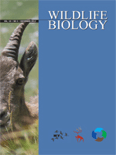
WILDLIFE BIOLOGY
Empowering research to protect our planet's wildlife.WILDLIFE BIOLOGY is a prestigious open-access journal published by WILEY, dedicated to the dissemination of high-quality research in the fields of ecology, evolution, behavior, and conservation. With an impressive Impact Factor indicative of its scholarly relevance, the journal has been a cornerstone for researchers since its inception in 1995, now extending its convergence through 2024. Recognized within the top Q1 and Q2 quartiles across various categories—including Ecology, Evolution, Behavior and Systematics and Management, Monitoring, Policy and Law—this journal plays a crucial role in fostering knowledge and promoting effective solutions in wildlife biology. The journal serves a diverse audience, offering robust access options since 2014, ensuring that vital research is freely available to professionals, researchers, and students alike. With its base in Denmark, the journal encourages contributions that address pressing wildlife management issues and informs policy development, further cementing its significance in the ecological research community.

TROPICAL ECOLOGY
Fostering Sustainable Solutions for Tropical EnvironmentsTropical Ecology is a distinguished journal published by SpringerNature that has been at the forefront of advancing the field of ecology since its inception. With a focus on tropical ecosystems, it addresses critical areas such as conservation biology, systematics, and environmental science. The journal is indexed within leading databases and enjoys a respectable impact factor, ranking in the second quartile (Q2) in Ecology as well as in Plant Science, and third quartile (Q3) in Ecology, Evolution, Behavior and Systematics for 2023. Its insightful research contributions place it among the top-tier publications in Agricultural and Biological Sciences, specifically in rankings such as #185 in Plant Science and #178 in Ecology. While it currently operates under subscription access, it remains an essential resource for researchers, professionals, and students interested in the dynamics of tropical environments, fostering a greater understanding of ecological principles and practices that are pivotal for sustainable development. The journal operates with continuous publication from 1976 to 2024, ensuring timely dissemination of impactful research findings that contribute to the global body of knowledge.